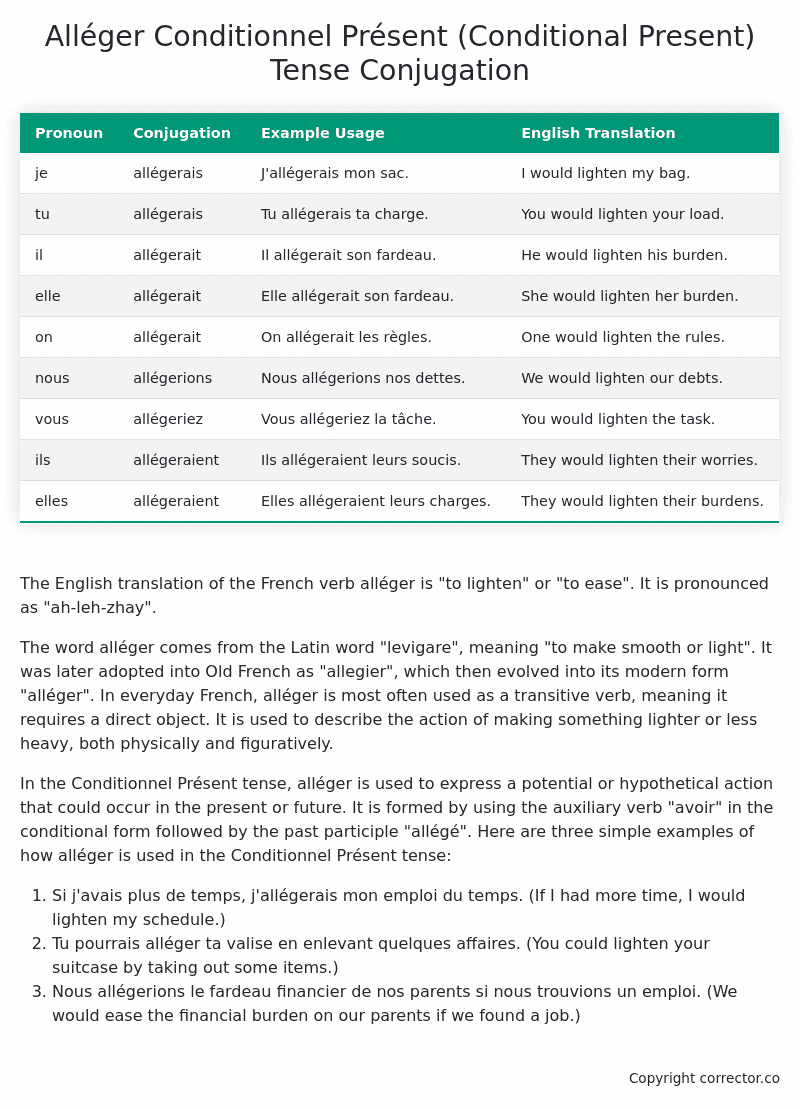Conditionnel Présent (Conditional Present) Tense Conjugation of the French Verb alléger
Introduction to the verb alléger
The English translation of the French verb alléger is “to lighten” or “to ease”. It is pronounced as “ah-leh-zhay”.
The word alléger comes from the Latin word “levigare”, meaning “to make smooth or light”. It was later adopted into Old French as “allegier”, which then evolved into its modern form “alléger”. In everyday French, alléger is most often used as a transitive verb, meaning it requires a direct object. It is used to describe the action of making something lighter or less heavy, both physically and figuratively.
In the Conditionnel Présent tense, alléger is used to express a potential or hypothetical action that could occur in the present or future. It is formed by using the auxiliary verb “avoir” in the conditional form followed by the past participle “allégé”. Here are three simple examples of how alléger is used in the Conditionnel Présent tense:
- Si j’avais plus de temps, j’allégerais mon emploi du temps. (If I had more time, I would lighten my schedule.)
- Tu pourrais alléger ta valise en enlevant quelques affaires. (You could lighten your suitcase by taking out some items.)
- Nous allégerions le fardeau financier de nos parents si nous trouvions un emploi. (We would ease the financial burden on our parents if we found a job.)
Table of the Conditionnel Présent (Conditional Present) Tense Conjugation of alléger
| Pronoun | Conjugation | Example Usage | English Translation |
|---|---|---|---|
| je | allégerais | J’allégerais mon sac. | I would lighten my bag. |
| tu | allégerais | Tu allégerais ta charge. | You would lighten your load. |
| il | allégerait | Il allégerait son fardeau. | He would lighten his burden. |
| elle | allégerait | Elle allégerait son fardeau. | She would lighten her burden. |
| on | allégerait | On allégerait les règles. | One would lighten the rules. |
| nous | allégerions | Nous allégerions nos dettes. | We would lighten our debts. |
| vous | allégeriez | Vous allégeriez la tâche. | You would lighten the task. |
| ils | allégeraient | Ils allégeraient leurs soucis. | They would lighten their worries. |
| elles | allégeraient | Elles allégeraient leurs charges. | They would lighten their burdens. |
Other Conjugations for Alléger.
Le Present (Present Tense) Conjugation of the French Verb alléger
Imparfait (Imperfect) Tense Conjugation of the French Verb alléger
Passé Simple (Simple Past) Tense Conjugation of the French Verb alléger
Passé Composé (Present Perfect) Tense Conjugation of the French Verb alléger
Futur Simple (Simple Future) Tense Conjugation of the French Verb alléger
Futur Proche (Near Future) Tense Conjugation of the French Verb alléger
Plus-que-parfait (Pluperfect) Tense Conjugation of the French Verb alléger
Passé Antérieur (Past Anterior) Tense Conjugation of the French Verb alléger
Futur Antérieur (Future Anterior) Tense Conjugation of the French Verb alléger
Subjonctif Présent (Subjunctive Present) Tense Conjugation of the French Verb alléger
Subjonctif Passé (Subjunctive Past) Tense Conjugation of the French Verb alléger
Subjonctif Imparfait (Subjunctive Imperfect) Tense Conjugation of the French Verb alléger
Subjonctif Plus-que-parfait (Subjunctive Pluperfect) Tense Conjugation of the French Verb alléger
Conditionnel Présent (Conditional Present) Tense Conjugation of the French Verb alléger (this article)
Conditionnel Passé (Conditional Past) Tense Conjugation of the French Verb alléger
L’impératif Présent (Imperative Present) Tense Conjugation of the French Verb alléger
L’infinitif Présent (Infinitive Present) Tense Conjugation of the French Verb alléger
Struggling with French verbs or the language in general? Why not use our free French Grammar Checker – no registration required!
Get a FREE Download Study Sheet of this Conjugation 🔥
Simply right click the image below, click “save image” and get your free reference for the alléger Conditionnel Présent tense conjugation!

Alléger – About the French Conditionnel Présent (Conditional Present) Tense
Formation
Common Everyday Usage Patterns
Expressing Polite Requests
Expressing Hypothetical Situations
Expressing Doubt or Uncertainty
Interactions with Other Tenses
Present Tense
Past Tense
Future Tense
Conditional Perfect
Summary
Want More?
I hope you enjoyed this article on the verb alléger. Still in a learning mood? Check out another TOTALLY random French verb conjugation!


